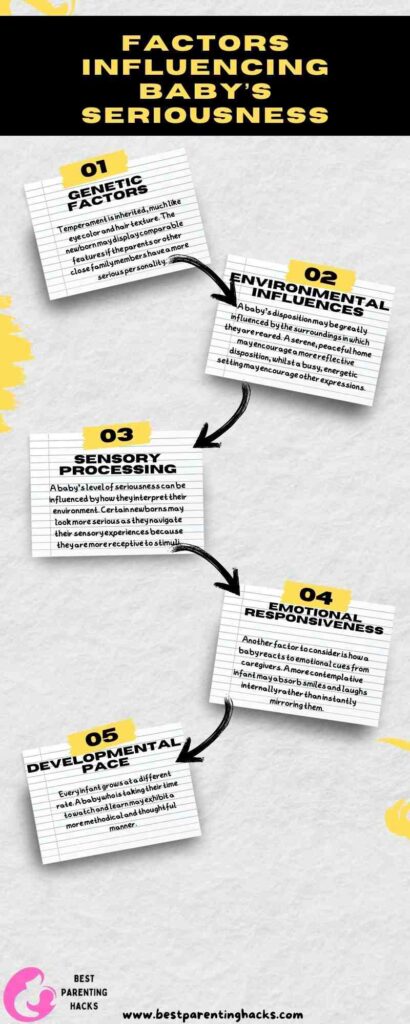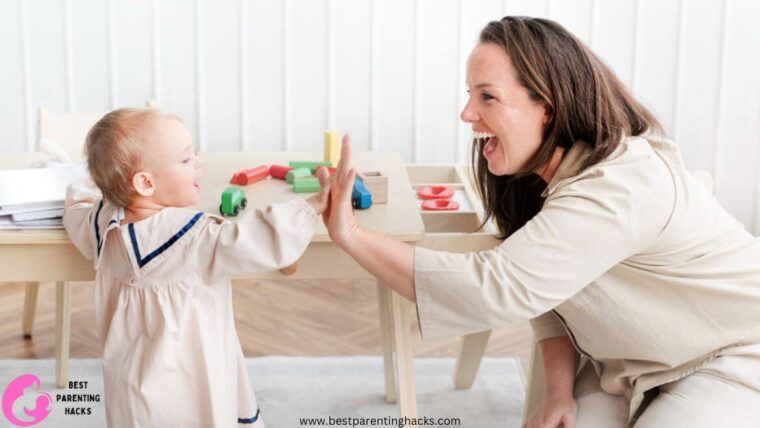Table of Contents
As parents one of the aspects is witnessing the diverse range of expressions that flicker across our child’s face. Every emotion they make, from happy giggles to inquisitive looks, provides insight into their evolving personalities. Not every baby, though, smiles or laughs easily. Some, like me, have a more serious expression, which frequently makes parents question what this seriousness means. Is it a reflection of their surroundings, an indication of intellect, or just a passing phase? When compared to newborns who are more outwardly expressive, parents who see their baby’s solemn attitude frequently ask themselves these kinds of inquiries.
Like many others, I have wondered, “Why is my baby so serious?” Through my experience, I’ve discovered that a baby’s serious demeanor is not only natural but also a sign of a very alert and observant personality. Even while it’s normal to long for those endearing grins and giggles, it’s crucial to recognize and value a serious baby’s distinct character. Their earnestness is not always an indication of trouble; rather, it’s a unique aspect of who they are and should be respected.

Factors Influencing Baby’s Seriousness
Many things can affect a baby’s temperament, including their tendency toward seriousness. Their worldview is shaped by an amalgam of personal characteristics, environment, and heredity.
1. Genetic Factors: Temperament is inherited, much like eye color and hair texture. The newborn may display comparable features if the parents or other close family members have a more serious personality.
2. Environmental Influences: A baby’s disposition may be greatly influenced by the surroundings in which they are reared. A serene, peaceful home may encourage a more reflective disposition, whilst a busy, energetic setting may encourage other expressions.
3. Sensory Processing: A baby’s level of seriousness can be influenced by how they interpret their environment. Certain newborns may look more serious as they navigate their sensory experiences because they are more receptive to stimuli.
4. Emotional Responsiveness: Another factor to consider is how a baby reacts to emotional cues from caregivers. A more contemplative infant may absorb smiles and laughs internally rather than instantly mirroring them.
5. Developmental Pace: Every infant grows at a different rate. A baby who is taking their time to watch and learn may exhibit a more methodical and thoughtful manner.
You Might Also Like to Read: How Many Baby Washcloths Do I Need?

Understanding Baby’s Serious Nature
The picture of a happy, laughing baby usually comes to mind when we think about babies. Not every baby, though, fits this description. Some people are inherently more serious, looking at them thoughtfully. This seriousness is a reflection of their unique personalities rather than anything to be concerned about. Serious babies are usually quite interested in their environment, taking in and analyzing information in their special ways. Even if kids may not giggle at every goofy face or sound, they are nonetheless happy.
Recognizing that newborn temperaments vary is essential to understanding a baby’s serious demeanor. There is a continuum, with some newborns being more talkative and others being more reserved. Seriousness can manifest in ways. For example, some newborns may always have contemplative expressions on their faces, while others may be less receptive to amusing interactions and may only grin when they are at ease. Parents must notice and comprehend these subtleties. It’s also critical to keep in mind that a baby’s seriousness is dynamic. Their expressions and interactions with the outside world are subject to change as they mature. This change is a normal aspect of their development and has to be accepted with tolerance and compassion.
1. Observation vs. Expression: Serious infants tend to observe more than they communicate. They may be absorbing every aspect of their surroundings, even your speech and the patterns on the ceiling.
2. Deep Processing: These babies may be taking in their experiences on a deeper level. Their serious expression may indicate a high level of attention and focus.
3. Comfort and Familiarity: Serious babies frequently save their giggles and smiles for times when they feel at ease and familiar. With close family members or in a familiar setting, they could be at their most expressive.
4. Temperament Variability: Every newborn has a different temperament. Being more serious by nature is a common attribute, much like being more gregarious or fun.
You Might Also Like to Read: Where to Store Baby Bottles After Sterilizing?

Parental Observations and Experiences
As many other parents have experienced, serious newborns frequently exhibit a complex inner world. Their seriousness is not a barrier, but rather an alternative way of living. Even though they may be more reserved, their happy moments are intensely felt and conveyed in subtle but profound ways.
1. Observation Skills: A lot of parents of infants with severe conditions see remarkable observation abilities. These infants often pick up on subtle shifts in their surroundings or people’s facial expressions.
2. Depth of Engagement: Serious babies tend to engage deeply when they do. Even though they don’t connect as often, their exchanges are deep and important.
3. Selective Smiling: Parents frequently discover that their grave infants save their smiles for sincere moments of comfort or delight.
4. Thoughtful Reactions: These infants may not respond to stimuli right away. Rather, they take their time to consider before reacting, frequently in deliberate ways.
5. Unique Milestones: Every serious infant experiences developmental milestones in a manner that is specific to them. Even while their trip doesn’t follow conventional schedules, it nonetheless develops nicely on its own.

Expert Insights
Child psychologists and pediatricians can offer important insights into the nature of serious newborns. They tell us that temperament varies naturally and seriousness is simply one of them.
1. Normal Range of Temperament: Scholars stress that a somber manner is consistent with an infant’s typical temperamental range. This isn’t a departure; it’s a natural variation.
2. Observation vs. Concern: Although it’s crucial to watch a baby’s behavior, doctors advise not to become overly alarmed until there are indications of a lack of involvement or developmental problems.
3. Personality Development: According to child psychologists, a baby’s serious demeanor may be a component of their developing personality, which may diversify as they become older.
4. Parental Support: Professionals advise parents to appreciate their serious baby’s individuality by creating a loving and understanding atmosphere that caters to their temperament.
Impact on Development
A newborn with a serious temperament may experience a variety of developmental effects, the majority of which are advantageous and indicative of their style of engaging with the outside world.
1. Cognitive Growth: Because of their keen observation and processing abilities, serious infants frequently exhibit robust cognitive development.
2. Emotional Depth: These infants may grow to have a complex emotional inner life that includes a high degree of empathy and comprehension.
3. Social Interactions: Serious babies may develop deep, meaningful relationships as they become older, even though they may be reserved in social situations.
4. Selective Engagement: Because of their seriousness, they frequently exhibit selective engagement, choosing to interact with individuals and in settings that make them feel most at ease.
5. Problem-Solving Skills: Because serious babies are introspective by nature, they may have high problem-solving abilities because they take more time to observe and comprehend their environment before acting.

Encouraging Smiles and Laughter
It takes time and compassion to make a serious infant grin and giggle. It requires determining what fascinates them and deciphering their cues. The following are some tactics that I have found effective:
• Observing Their Interests: Pay careful attention to the things that interest your infant and utilize those as a starting point for conversation.
• Quality Time: Give your infant undisturbed attention. Sometimes, all they want is a quiet, concentrated conversation to feel at ease enough to grin.
• Gentle Play: Don’t unnecessarily stimulate yourself when you play. This might involve conversing with them, playing quiet activities, or even softly singing.
• Facial Expressions: Communicate with a range of expressions on your face. A serious infant may not always react until they see the entire spectrum of emotions.
• Patience and Persistence: Exercise both of these qualities. Keep in mind that every infant is unique, so what suits one may not suit another.
When to Seek Help
Seriousness is usually a natural aspect of a baby’s temperament, but occasionally it may be a sign of developmental issues. When to Think About Getting Help:
• Lack of Social Responsiveness: If your child appears utterly uninterested in others or does not react to social cues.
• Delayed Milestones: If your child is falling well behind in terms of chattering, smiling, or making eye contact, these are delayed milestones.
• Changes in Behavior: Consult a pediatrician about any significant behavioral changes.
• Parental Instinct: As a parent, follow your gut. Consulting a healthcare expert is useful if you sense something is not quite right.
• Holistic Approach: When determining how bad a situation is, don’t forget to take your baby’s general health and development into account.

Conclusion
Having a severe infant has made me appreciate the value of uniqueness in a child’s growth. Every grin and interaction appear to be a wonderful gift, providing a glimpse into their contemplative world. As parents, it is our duty to create a nurturing environment for our children that cherishes and embraces their uniqueness. Since their seriousness adds to their distinct perspective on the world, we should embrace it as a part of who they are. Accept the trip with love, tolerance, and comprehension, and observe as your serious child grows into a lovely person uniquely.
FAQs
1. Is my baby’s seriousness normal?
Yes, it is entirely typical. Seriousness is simply one of the many temperaments that newborns, like adults, get to choose from.
2. Will my child always behave in this manner?
Over time, temperaments can change. As they get older and more at ease in their surroundings, your baby could start expressing themselves more.
3. How can I get my child to smile more often?
Spend time with your infant, play gently, and pay attention to what fascinates them. Every infant has different joy-inducing factors.
4. Is it wise for me to worry about my infant’s development?
Being serious is not always a reason for alarm. See a physician, though, if you see further symptoms, such as delayed milestones or a lack of social engagement.
5. Can my baby’s social abilities be impacted by a severe nature?
Serious babies may form enduring, meaningful relationships, even if they may be more selective in their social contacts. It’s critical to give them socializing chances that accommodate their comfort zone.
6. How can I encourage the growth of my serious infant?
Give them a caring atmosphere that honors their disposition. Allow youngsters to explore at their own speed and participate in activities that match their interests.
7. Does having a severe child have any advantages?
Indeed, serious newborns frequently possess keen observational abilities, a profound awareness of emotions, and may




